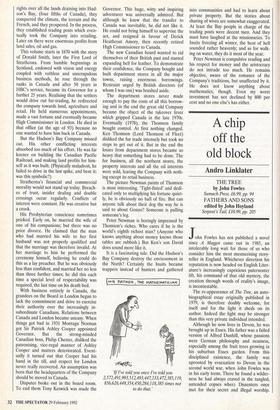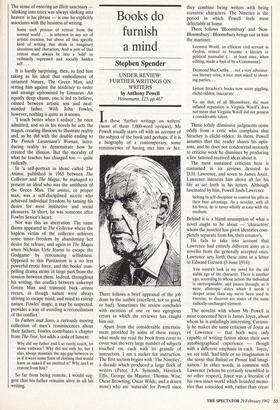A chip off the old block
Andro Linklater
John Fowles has not published a novel since A Maot came out in 1985, an intolerably long wait for those of us who consider him the most mesmerising story- teller in England. Whichever direction his reputation is now headed on English Liter- ature's increasingly capricious paternoster lift, his command of that old mystery, the creation through words of reality's image, is incontestable.
The re-appearance of The Tree, an auto- biographical essay originally published in 1979, is therefore doubly welcome, for itself and for the light it sheds on its author. Indeed the light may be stronger than this very private individual intended.
Although he now lives in Devon, he was brought up in Essex. His father was a failed version of Alfred Dunhill, whose passions were German philosophy and neatness, especially among the fruit trees growing in his suburban Essex garden. From this disciplined existence, the family was uprooted by evacuation to Devon in the second world war, when John Fowles was in his early teens. There he found a wilder- ness he had always craved in the tangled, untended copses where Dissenters once met for their secret and illegal worship. The sense of entering an illicit sanctuary — 'slinking into trees was always slinking into heaven' is his phrase — is one he explicitly associates with the business of writing.
Some such process of retreat from the normal world . . . is inherent in any act of artistic creation, but above all that specific kind of writing that deals in imaginary situations and characters. And a part of that retreat must always be into a 'wild' or ordinarily repressed and socially hidden self ...
It is hardly surprising, then, to find him taking as his ideal that embodiment of untamed Nature, The Green Man, and setting him against the tendency to order and arrange epitomised by Linnaeus. An equally deep chasm, one is led to believe, existed between artistic son and neat- minded father. With John Fowles, however, nothing is quite as it seems.
'I teach better when I seduce', he once admitted, and so in his novels he acts the magus, creating illusions to illustrate reality and, as he did with the double ending to The French Lieutenant's Woman, intro- ducing reality to demonstrate how he created the illusion. But the morality of what he teaches has changed too — quite radically.
In 'a self-portrait in ideas' called The Aristos, published in 1965 between The Collector and The Magus, he managed to present an ideal who was the antithesis of the Green Man. The aristos, or proper man, was a self-disciplined ascetic who achieved individual freedom by taming his desire for most instinctive and social pleasures. In short, he was someone after Fowles Senior's heart.
Nor was this an aberration. The same theme appeared in The Collector where the hapless victim of the collector achieves some inner freedom by abandoning her desire for release, and again in The Magus when Nicholas Urfe learns to escape the Godgame by renouncing selfishness. Opposed to this Puritanism is a no less powerful erotic force, and the books' com- pelling drama stems in large part from the tension between them. Indeed, throughout his writing, the conflict between unkempt Green Man and trimmed back aristos recurs, as though nature were always striving to escape mind, and mind to entrap nature. Fowles' magic, it may be suspected, provides a way of avoiding a reconciliation of the conflict.
In Fathers and Sons, a curiously moving collection of men's reminiscences about their fathers, Fowles contributes a chapter from The Tree, but adds a coda of lament: Why did my father and 1 so rarely touch, let alone embrace? Why did not only he, but I also, always maintain the age-gap between us as if it were some form of clothing that would leave us naked if we omitted it? Why am 1 so remote from him?
So far from being remote, I would sug- gest that his father remains alive in all his writing.



















































 Previous page
Previous page